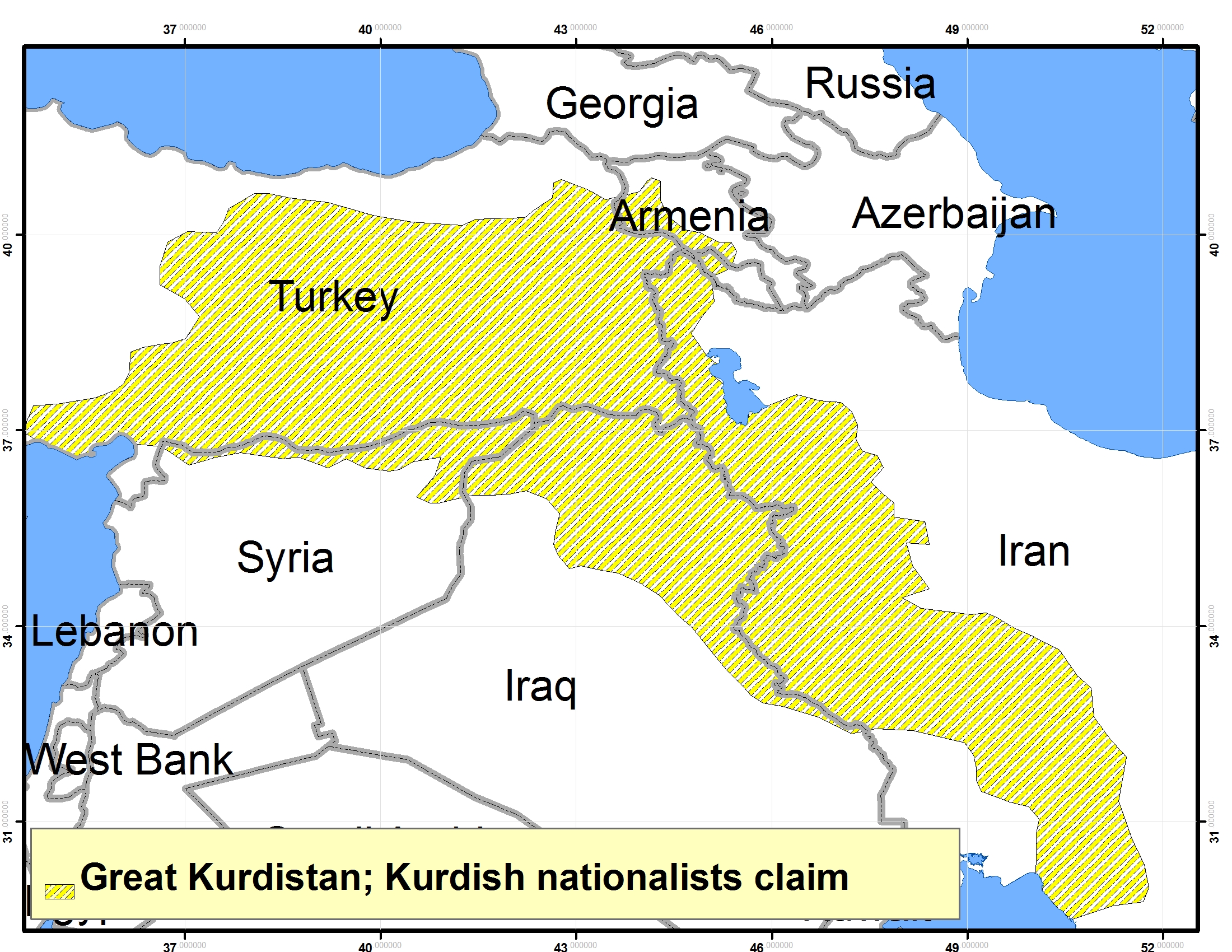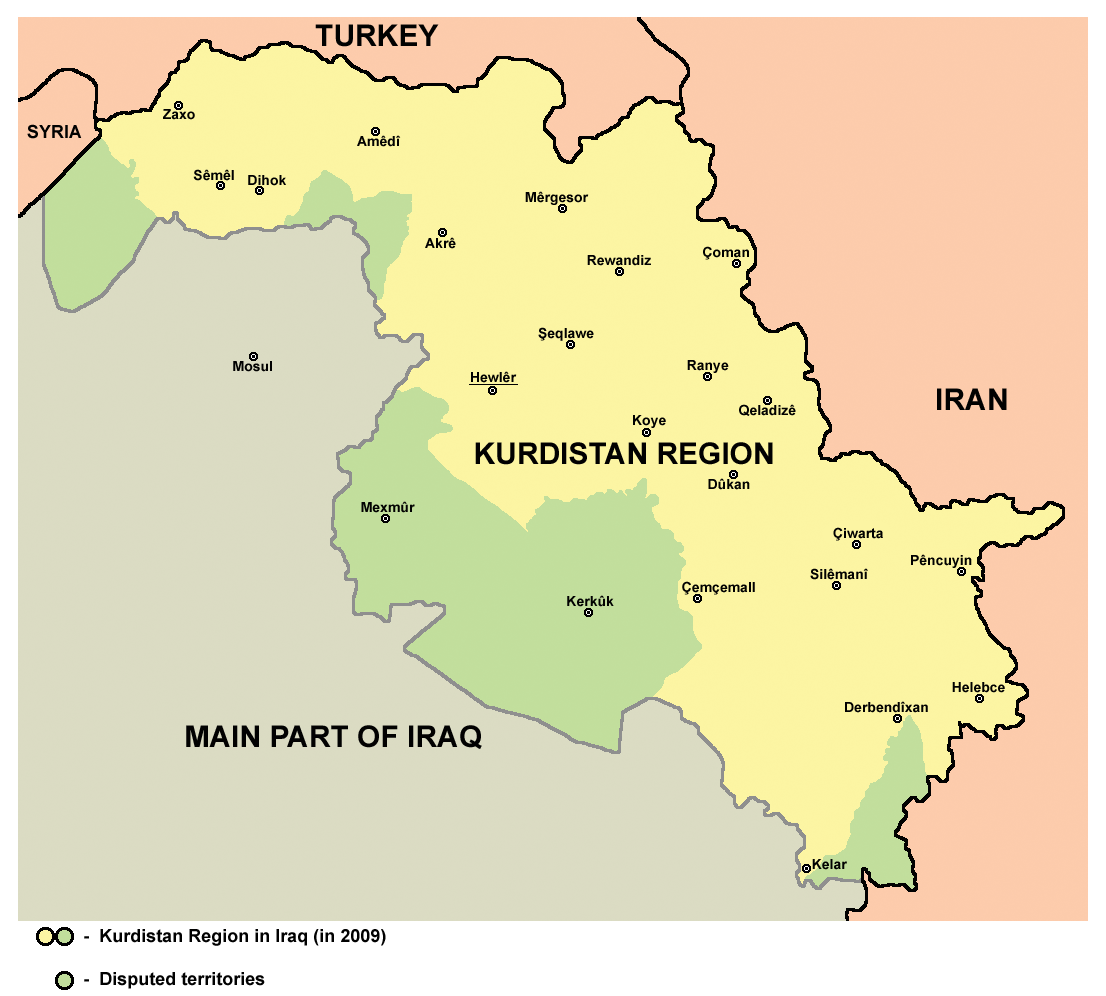Written by Eric Pichon,
[last update December 2016]
Consult also our Briefing: Regional implications of Iraqi Kurdistan’s quest for independence (6 December 2016)
On 3 July 2014, the President of the Kurdish Regional Government (KRG) in Iraq asked the regional parliament to prepare a referendum on independence.

The KRG is in a strong position to break free of Iraq: whilst the Iraqi army retreated in the face of the “Islamic State” fighters (formerly ISIS, Islamic State in Iraq and al-Sham (Levant)), Kurdish soldiers (“Peshmerga”) are still defending their positions and have even taken control of Kirkuk, an area they lost in 2003.
Nevertheless, even if Iraq is falling apart, obstacles to full independence for Iraqi Kurdistan remain. The first will be the exact definition of the borders of this potential new country: in particular, Iraq has probably no intention of abandoning the oil-rich region of Kirkuk; and this will certainly make a difference to the economic sustainability of the new country.
Internationally, the United States are still the main opponent of Iraqi partition. Syria, Turkey and Iran are also concerned: although an independent “Greater Kurdistan” is not an option for the near future, as the Kurdish political spectrum is fragmented; Iraq’s example could nevertheless lead their own Kurdish populations to claim greater empowerment. On the other hand, a strong Kurdish state on their borders could help them keep the threat of the Sunni Caliphate IS wants to restore at bay.
You will find below background information, as well as analyses on the developments on this issue.
Overview
Greater Kurdistan

< Ebrahimi-Amir. Great Kurdistan; Kurdish nationalists claim [map]. Based on “Political Geography of Iran”, Dr. Mohammad Reza Hafez Nia, SMT, Tehran, 2002 (ISBN 964-459-672-2), p. 167. (Farsi book).
Where the Kurds are and what Kurdistan might look like. in: 40 Maps that explain the Middle East. (Retrieved July 7, 2014).
How to Redraw the World Map: Lessons From the Idea, and Rejection, of Kurdistan. (2014, July 5). The New York Times. – An historical analysis.
Yezid Sayigh. (2014, June 26). Are the Sykes-Picot Borders Being Redrawn? Carnegie Middle East Center.
The situation in Iraq

< Panonian. Kurdistan 2009 [map] Own work.
Ilham Younes. (2014, June 9). Tensions entre l’Irak et le Kurdistan irakien autour des hydrocarbures : quels enjeux ? Les Clés du Moyen-Orient. – An analysis of the oil dispute between the KRG and the Iraqi government – written before the Peshmarga took control over Kirkurk.
The Rise of ISIS, a Golden Opportunity for Iraq’s Kurds. (2014, June 19). Carnegie Endowment for International Peace.
Didier Billon. (2014, June 24). Quel avenir pour les frontières en Irak ? Affaires Stratégiques. – Iraq’s divisions into ethnic or religious entities is prevailing since the 2003 US-led invasion, but IS advance has reinforced them.
Guillaume Perrier. (2014, July 3). Le Kurdistan irakien rêve d’indépendance, mais les vieilles divisions perdurent. LeMonde.fr, édition Abonnés.
S. Tisdall. (2014, July 3). Kurdistan faces long, fraught road to sustainable independence. The Guardian. – An assessment of strengths and weaknesses of a Kurdish state, based on a review of several analyses.
Kurdish Regional Government’s positions
About the Kurdish Regional Government and KRG’s mission to the European Union: http://www.krgbrussels.org/index.php/about-krg
Massoud Barzani’s portrait: Massoud Barzani : un fervent nationaliste kurde au cœur de la crise irakienne. (2014, August 22). Geopolis.
On KRG’s official website: President Barzani asks Parliament to begin work on referendum. (2014, July 4). KRG.org.
Iraq Kurdistan referendum planned. (2014, July 1). BBC News. An interview of Massoud Barzani, KRG’s president, where he expressed his will to hold a referendum on independence “within months”.
Kurdistan Seeks UN Help for Kirkuk Referendum. (2014, June 30). Rudaw [affiliated to Barzani’s Kurdish Democratic Party].
A few days before the call for a referendum on independence, KRG’s president called for a referendum in Kirkuk, to decide if it will become part of the Kurdistan Region.
EU approach
The EU “calls on the Government of Iraq and the Kurdistan Regional Government to work together […] to find a swift and sustainable agreement on all pending subjects, including energy exports and oil revenue sharing, respecting Iraq’s unity, sovereignty and territorial integrity.” (Council conclusions on Iraq, Foreign Affairs Council meeting, 23 June 2014)
In August 2014 the EU “reiterate[d] its firm commitment to Iraq’s unity” but nevertheless “welcome[d] the decision by individual Member States to respond positively to the call by the Kurdish regional authorities to provide urgently military material (…) with the consent of the Iraqi national authorities.” (Council conclusions on Iraq. Foreign Affairs Council Meeeting, 15 August 2014).
On the field, the EU has regular contacts with the Kurdish Regional Government:
- In 2009 the European Commission set an election observation mission for the regional elections in Kurdistan.
- The EU Integrated Rule of Law Mission for Iraq (EUJUST LEX Iraq, 1/07/2005-31/12/2013) had a “strong relationship” with Kurdish authorities.
- EU aid is also allocated to the Syrian refugee camps in Iraqi Kurdistan.
European External Action Service: EU Delegation to Iraq
European Parliament’s resolutions and initiatives
Possible impacts on the region
Brendan O’Leary. (2014, August 18). It is politically and morally right for European states to support Kurdish forces in Iraq? LSE Blogs, London School of Economics and Political Science.
The author, a professor of political science, was an advisor to the KRG during the making of Iraq’s Constitution. He discusses the legal and political implications of the 15/08/2014 EU Council’s statements. (cf above, EU approach)
Murphy, D. (2014, July 3). The Kurdish push for independence is a big problem for Baghdad. Christian Science Monitor.
This article examines what are the implications for Iraq of losing Kurdistan, and the reasons why the United States are unwilling to accept Kurds break free of Iraq, while Turkey probably won’t oppose it.
Soner Cagaptay. (2014, July 1). Turkey’s Kurdish Buffer. The Washington Institute for Near East Policy.
The evolution of Turkey’s policy towards Kurds: “By maintaining close ties with Iraqi Kurds, continuing the peace talks with Turkish Kurds, and developing security relations with Syrian Kurds, Ankara can help stave off the threats now looming on its southern borders”.
Recognising Iraqi Kurdistan may rebound on Ankara. (2014, June 30); Ankara may take a harder line against Iraqi Kurds. (2014, July 9). Oxford Analytica.
These analyses demonstrate how economic and geopolitical considerations have led Turkey to change its position from opposing a split of Iraq to accepting an independent Kurdish state, provided KRG doesn’t cut a deal with IS on the oil routes.
Ana Villellas. (2014, April). The Kurds in the spotlight: local and regional challenges. Norwegian Peacebuilding Resource Center.
“An examination of the challenges relating to the Kurds in Syria, Turkey and Iraq.”
Ted Galen Carpenter. (2013, November 25). The Rise of Greater Kurdistan. Cato Institute.
US policy is caught between favouring the autonomy of “the most democratic, procapitalist and pro-Western faction” and taking the risk of further weakening Middle Eastern states.
Kamal Chomani. (2013, November 22). Turkey, Iran influence Iraqi Kurdistan politics. Al-Monitor.
KRG’s politics are influenced by its relationship with neighbouring countries, and with their Kurdish activists.








